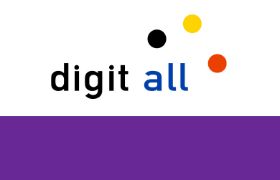Governments, companies, public bodies and social organizations sign Digital Inclusion Charter
Today DigitAll, with BNP Paribas Fortis and Proximus as main partners, has brought various governments of our country together with about 30 companies, public bodies and social organizations on the topic of digital inclusion. In their effort to narrow down the digital divide in Belgium, the various parties will sign the Digital Inclusion Charter. In an increasingly digital world, they are committed to undertaking concrete actions to fight digital exclusion.
Digital inequality leads to social exclusion. This is the conclusion of a report by the King Baudouin Foundation from June 2020. As many as 1 in 10 Belgian households have no Internet access at home. For low income families, this figure rises to almost 3 in 10. Many people also have no or inadequate digital skills. As many as 40% are at risk of digital exclusion. Finally, the report also points out inequalities in the use of essential services. Some 57% of Belgians with a low level of education, for example, have never used the Internet to submit essential documents to the government. In a time where digital is becoming increasingly important, the digital divide weighs heavily on the social integration of the most vulnerable.
DigitAll is the new name of the Digital Inclusion Ecosystem launched by BNP Paribas Fortis in November 2020. The aim of the initiative, which has already been signed by nineteen companies, eight social organizations and seven public bodies, is to narrow down the digital divide in Belgium by putting digital inclusion higher on the agenda. The ecosystem is currently working on three specific projects: a national awareness campaign to highlight the importance of digital inclusion, an estimation of the user friendliness of digital tools in the form of a digital inclusion index, and a mobile solution to teach digital skills to hard-to-reach target groups.
Digital Inclusion Charter
Today, some thirty parties are endorsing the initiative, taking it even one step further. Proximus and BNP Paribas Fortis are bringing the parties together to seal their involvement in the project. They will affix their signatures (in digital form of course) to the Digital Inclusion Charter. By doing so, they affirm their commitment to promoting digital inclusion in Belgium. The Charter facilitates the development of a network around digital inclusion and also contributes to raising awareness of the digital divide.

Proximus is committed to making digital technologies accessible to everyone, regardless of physical abilities, economic background, cultural origin, education or age. Our support to DigitAll, gathering various stakeholders around a common commitment to foster digital inclusion, is a logical outcome of this ambition. I am convinced that exchanging ideas and defining common actions together with all the partners involved can lead to substantial progress in ensuring an inclusive, safe and sustainable Belgium.
Many people are at risk of social exclusion because, for a variety of reasons, they do not make use of digital resources. In our modern society, digital inclusion is an absolute prerequisite for social inclusion. That is why BNP Paribas Fortis and the other partners in the ecosystem are making concrete commitments to combat digital exclusion.
Nine commitments
The Digital Inclusion Charter includes nine concrete commitments to which the signatories subscribe:
- Identify and share best practices to improve digital inclusion.
- Identify constraints to digital inclusion and define common actions to eliminate those constraints.
- Urge the top management of the own organization to own and drive the commitment.
- Improve digital inclusion within the own organization by promoting internal education and sharing actions and progress.
- Promote digital inclusion outside the own organization to increase the number of signatories to the Digital Inclusion Charter and to strengthen its impact.
- Provide support to campaigns that aim to prioritize digital inclusion, as the general public is still insufficiently aware of the digital divide.
- Gradually implement a procedure within the own organization to assess the extent to which digital inclusion is promoted among employees, customers and beneficiaries.
- Undertake actions to increase trust in digital tools, improve the feeling of online safety/security and protect users from potential abuse.
- Monitor the implementation of the Charter and, after three years, evaluate the Charter together with the other co-signatories to take stock of the situation and define possible follow-up actions.


